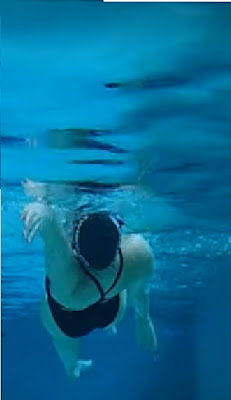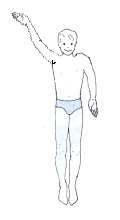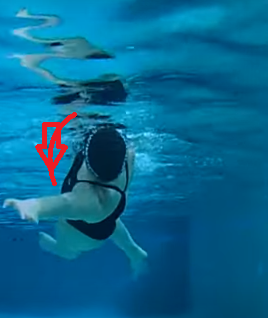Backstroke: Fix Those Bent Elbows With Better Body Rotation
Honestly, if you are a beginner as long as you are making good progress in the water, then if you want to bend your elbows doing backstroke you go right ahead. However, if you want a more efficient stoke you need to fix those bent elbows in your backstroke with better body rotation
 |
| Streight Arm Backstroke |
Figure 1 below is not a very good drawing of someone swimming backstroke with bent elbows but I hope it is good enough for you to get the idea.
The problem with bent elbows when you are doing backstroke is that it is way less efficient. This is because every time your hand goes in the water you actually push in the direction opposite to the one you are intending to swim. At least for a little bit.
 |
| Fig.1 Arm Bent At Elbow Over The Head |
There are actually 2 steps to solve this.
The first step is simply to swim or get your student to swim with the arms away from the head (Fig.2).
Now I know that this seems counterintuitive. After all, you may be one of the many swimmers that have been told that you have to swim with your arms close to your ears. You may even be one of those swim teachers that teach that way. And this is not wrong but it only works if the student has reasonable rotation in their body when they stroke in the first place. (Fig.3 &4).
If a swimmer has no or very little rotation in their body when they stroke they are going to need to bend their elbows so they can get their arm in the water (Fig.1).
 |
| Fig.2 Backstroke Fix Without Rotation |
Ideally, you teach a student body rotation (Figures 3 & 4) and that will fix their bent elbows. But what do you do whilst the student is learning to rotate their body? In fact, what do you do if you have a student come to you with this bent elbow fault? What do you do if a student is struggling to get the idea of body rotation?
 |
| Fig.3 Straight Arm Backstroke Entry |
 |
| Fig.4 Straight Arm Backstroke Entry With Rotation |
My approach is simple. I start a student out with their arms wide and encourage them to reach as far as they can behind them. Then I encourage them to turn a little as they reach so they can reach a bit further. The more they do this the more their arms get closer to their head and the more their body rotates (Fig.4). As long as they are keeping their head still.
In the process, not only do they get more rotation but they develop a longer stroke so they can pull more water and improve the efficiency of their stroke.
There are lots of drills to help improve body rotation and you should feel free to use them to add variety to your lessons. But the above works no matter if the swimmer is a beginner or a swimmer that needs stroke correction.
Enjoy
Richard







No comments:
Post a Comment